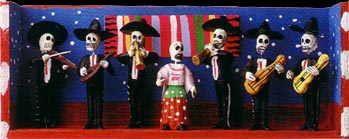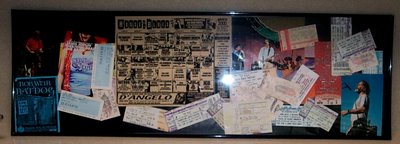A few Bobby & Ratdoggy articles out today!
................
The Year Of The RatDog
By Rick Koster
Published on 11/9/2006 in Entertainment » Music
from www.theday.com
When it comes to a performance by Bob Weir's RatDog, you always know what you're going to get — and you never know what you're going to get.
In the context of the former, you'll hear lots of jamming. Oh, yes. Tons of it. Sometimes this attains almost sublime levels. Sometimes it takes on the torturous characteristics of someone jabbing your tooth-roots with a fork covered in olive brine.
As far as not knowing what you're going to hear, consider this when you contemplate the RD show tonight at the Mohegan Sun Arena: they will play long two sets, choosing between about 70 Grateful Dead songs, a few Weir solo tunes and Bob Dylan tunes, and the 10 or so compositions from RatDog's one and only studio album. If you're keeping track of such things, you are far more likely to hear, for example, Weir's “Easy Answers” or the Dead's “St. Stephen” than GD obscurities such as “Here Comes Sunshine” — but you just never know.
Equally and perhaps more entertaining will be the crowd itself. There really are people who sustain themselves by traveling to each of these shows and that constitutes their lives. They will be in varying states of cleanliness and tie-dyed apparel, and if you can corner the patchouli market at the merchandise tent, you'll be rich.
Opening the show is Blues Traveler, and John Popper still plays the harmonica in a fashion that reminds me of sticking my head in one of those machines that crush abandoned cars.
................................
From
WWW.CTNOW.COMEric R. Danton
Bob Weir Brings 'Amalgam' to Sun
November 9, 2006
For a guy who has long been considered a mainstay of rock music, Bob Weir has a pretty narrow definition of what rock 'n' roll actually is.
"If you listen to an old Chuck Berry record or a Little Richard record, that was rock 'n' roll," Weir says from his Bay Area home, before starting a tour with his band RatDog that plays tonight at Mohegan Sun. "They were playing a shuffle against straight time. That's what rock 'n' roll meant. It was new."
Fair enough, then. If that's the case, though, what does Weir calls the music he's been making for close to 40 years, first with various incarnations of the Grateful Dead and now as the leader of RatDog?
"It's an amalgam," the guitarist says. "Our sources of inspiration are pretty vast. We take a little from jazz, a little from blues, a little from country. Old forms, new forms, a little modern classical and anything else that pops up.
Every now and again we'll throw in elements we lifted from modern pop. We take all comers and try to mix them in."
That ecumenical approach, and the skill with which Weir mixes and matches styles, has made him a towering figure on the jam-band scene that originally sprung up around the Dead. It's a genre less reliant on studio records than on relentless touring and live performances.
RatDog has played more than 500 shows since getting together in 1995, yet the band has only released one studio album, 2000's "Evening Moods." That's not to say the band isn't writing new songs.
"We've got a bunch of new material, so we're trying to figure out what exactly we're going to do with it," Weir says. "I don't know if making a record is going to be the ticket for us, because we exist square in the middle of the file-sharing demographic, so going to the effort and expense of making a record doesn't have that big a payoff for us. But we write songs still, and we'll put them out in some manner, or we'll just play them."
He's spent a lot of years on the road, though. Any plans to scale back on touring?
"Maybe, but it was what I was born to do," Weir says.
"I don't think there can be much doubt of that, so as long as I'm looking for something to justify my existence, I'm going to keep at it."
Bob Weir & RatDog perform tonight at Mohegan Sun with Blues Traveler. Tickets are $35 for the 7 p.m. show. Information: 860-862-7163.
.................
aND ALSO THIS:
.....
Grateful Dead guitarist carries Garcia with him on stage with his band Ratdog
By DAVID PERRY, Sun Staff
Article Last Updated:11/09/2006 03:34:45 PM EST
It's been more than four decades since Bob Weir picked up a Lowell-born author's book and became forever changed.
"I read On The Road in 1964," says Weir by phone from his home in Mill Valley, CA. "That was my first year as a bohemian. I was still living with my parents, but I'd begun working with Jerry (Garcia) and Pigpen (Ron McKernan) in our jug band, and we were doing pretty well. But I picked up On The Road, put it in my back pocket and read it every chance I got. And it totally changed my life, that book."
He didn't know what he wanted from life before reading Jack Kerouac's most famous book, "but it told me the world is a wide-open place. Go get it."
As the Grateful Dead's rhythm guitarist and sometime lead singer, he did.
And like Kerouac's spontaneous prose, the Dead used recordings as reference points, taking flight in concert.
But like others in the band, Weir was restless to express himself, despite the Dead's success and touring schedule. Other means presented themselves. There were a couple
of solo albums under his own name, 1972's superb Ace, and Heaven Help the Fool in 1978. There were side bands, Kingfish, Bobby & The Midnites.
And then, there was Ratdog, the six-piece unit that plays Lowell Memorial Auditorium tomorrow night.
The band was born out of a longtime musical kinship with bassist Rob Wasserman. It blossomed into a full band just months before Garcia's death in August 1995. First, they added Jay Lane on drums, then keyboardist Jeff Chimenti. Guitarist Mark Karan has been there since the fall of 1998, and Kenny Brooks is on sax. When Wasserman left to concentrate on solo work, bassist Robin Sylvester signed on in 2003.
"I'm quite pleased with this band," says Weir, 59, who is thoughtful and personable in conversation. "The personnel has been stable for three to four years now, and most of us have been together longer than that. So the interplay can be pretty ferocious."
"Back in the days just after Jerry checked out, I wasn't ready to play with another lead guitarist. I just wasn't ready for that. So I had Matt Kelley playing harmonica and eventually, we decided to mix it up, bring in another lead."
He found Karan in The Other Ones, a reformation of Dead members with others. (Weir has also toured in 2002 and 2004 with The Dead.)
Weir describes a typical Ratdog set list as equal parts Dead tunes, Ratdog songs and covers of everyone from Bob Dylan to Willie Dixon and Chuck Berry.
"It's Ratdog, my back pages and a few covers. But the overall repertoire is pretty large at this point. And you know, the last couple of years, people have been charting this."
Ratdog has nailed down a repertoire of roughly 150 songs, "which gives us an opportunity to go for a while without repeating ourselves. "
It's a long way from the night 16-year-old Weir stumbled across the sound of banjo music in Palo Alto, CA. It was Garcia, in Dana Morgan's Music Store. They ended up playing together and formed Mother McCree's Uptown Jug Champions.
"At that point, in 64, I was a folkie," says Weir. "The big folk boom was going on and our jug band was getting real popular. Basically, jug bands were the city version of the minstrel bands that played on the river on the boats. Same guys playing the same instruments except we were on street corners instead of riverboats."
"It was fairly funky urban blues, pretty countrified, and I was totally enamored with that stuff. At one of my friends' house there was this collection of old 78s. And there were loads of told Bluebird records, the race records. And Garcia and I would listen and play. This was an amazing collection. Old jazz, Bessie Smith, and we did jug band versions. We learned that pretty thoroughly.
"Of course jug band music became funk music. It was just electrified. It was in the same cities Memphis, up and down the Mississippi and Ohio rivers."
Then came The Beatles.
"I listened to the radio, and they were all over it, as well as on TV. I saw these guys were having a lot of fun and it was real musical, melodic. I was working in the same music store at the time with Jerry. And those electric instruments started to look impossibly attractive to us."
And the jug band became the Warlocks and then the Grateful Dead.
Is it tough to lug around the legacy of The Dead?
"No, no, that's never a burden," says Weir. "It's really an MO for us, a modus operandi. It gives me a structure to work within. On a given night, a given concert, rather than play the same things. Something the Dead developed that was not about cranking out hits, but filling the evening with music in a way that comes out of interplay. Sometimes, we'll play a batch of songs real well and it still does not take off. And sometimes, we play the song maybe not A-plus, but it reaches that other level."
Weir is pleased with the dozens of Dead-inspired jam bands roaming the globe, a handful with large, faithful audiences.
"The thing that surprises me is ... I just do not understand how people can be satisfied with a road show where, like a lot of bands, it's played note-for-note. That'd just drive me out of it. I'd be firing guys right and left, or I'd be fired. I don't see how you can do that."
In the five years since he bought his first camera, Weir has become something of a photography buff. He listens to a wide array of music, "anything from rage metal to world music, and a lot of older jazz as well."
Some may be surprised to learn that one of the main influences in Weir's rhythm guitar playing is McCoy Tyner, the jazz bop pianist Weir discovered when he heard John Coltrane's Quartet at 17.
"It just blew my little mind," says Weir. "In particular, the chordal stuff Tyner was doing."
In the Grateful Dead, Weir was Tyner to Garcia's Coltrane.
Weir still carries Garcia with him, in a way.
"It was special. I can't say I miss him that much because he's still so much a part of what I do. He's still there with me. I can pretty much hear him on stage. 'Nah, don't go there.' Or, 'yeah, go there.' Jerry put a lot of life out there. So he's not really gone away."
David Perry's e-mail address is dperry@lowellsun.com.








